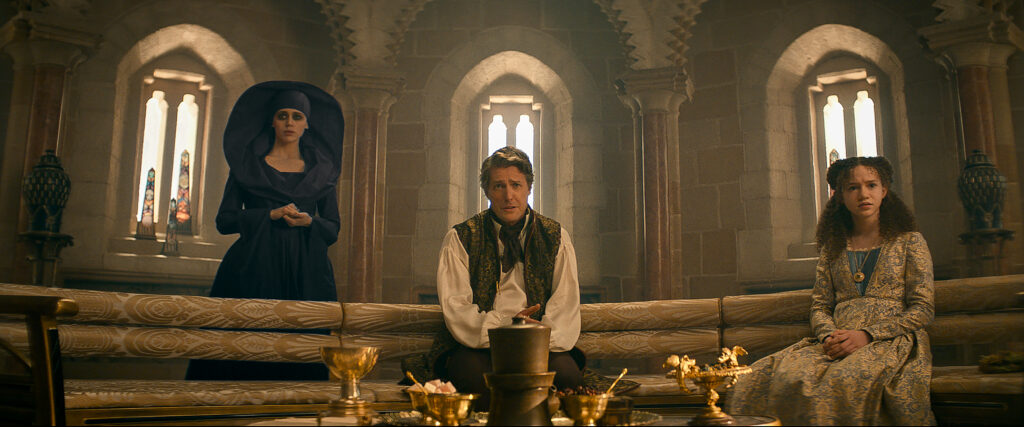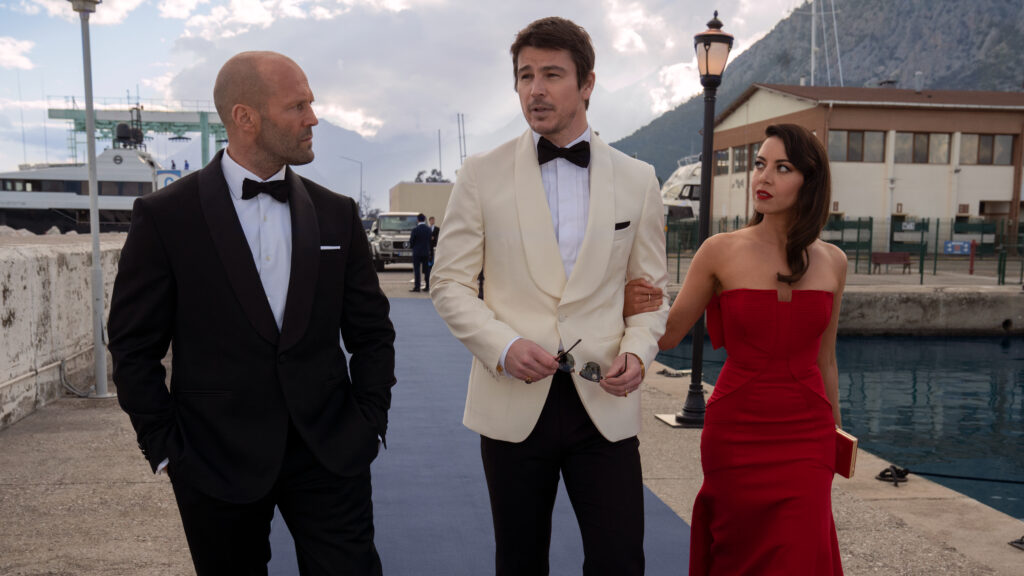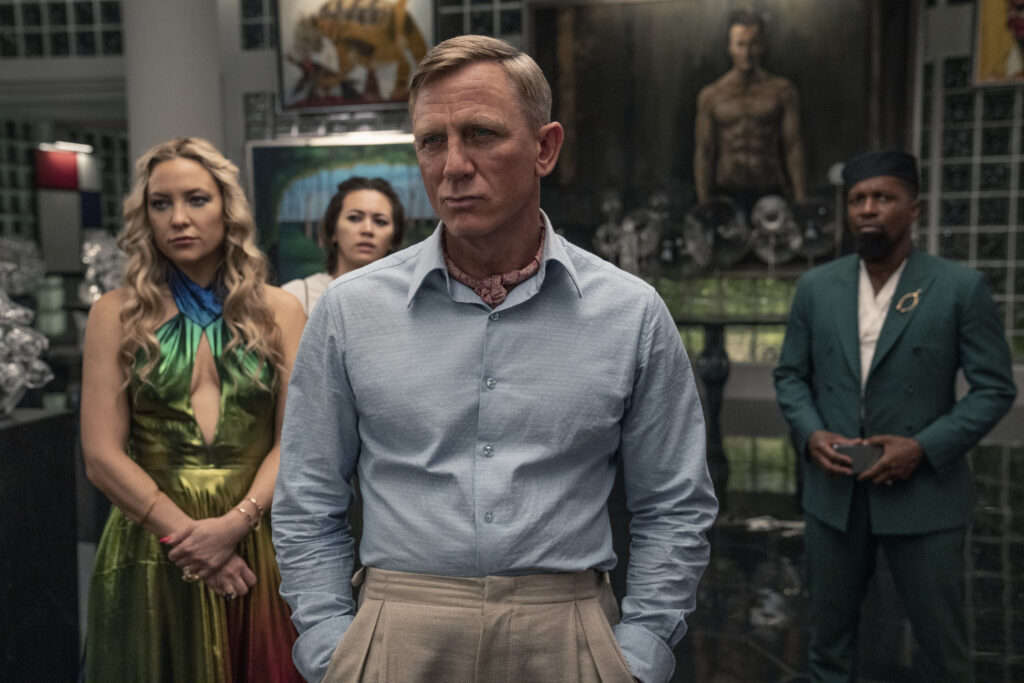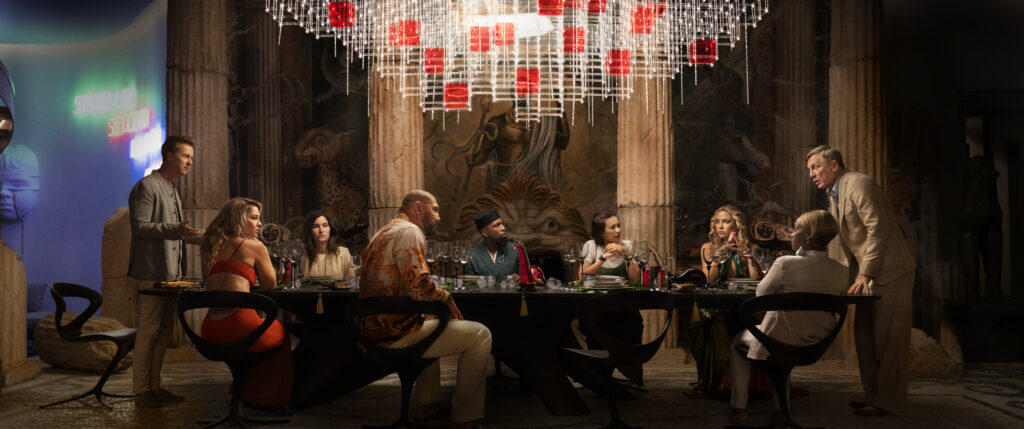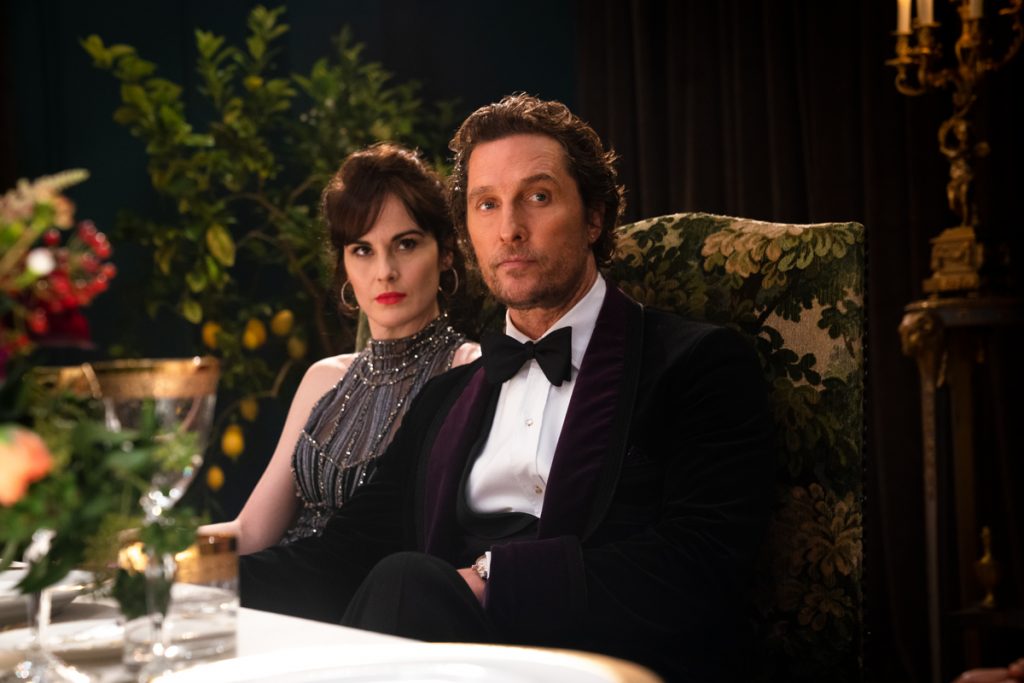December 16, 2023
by Carla Hay
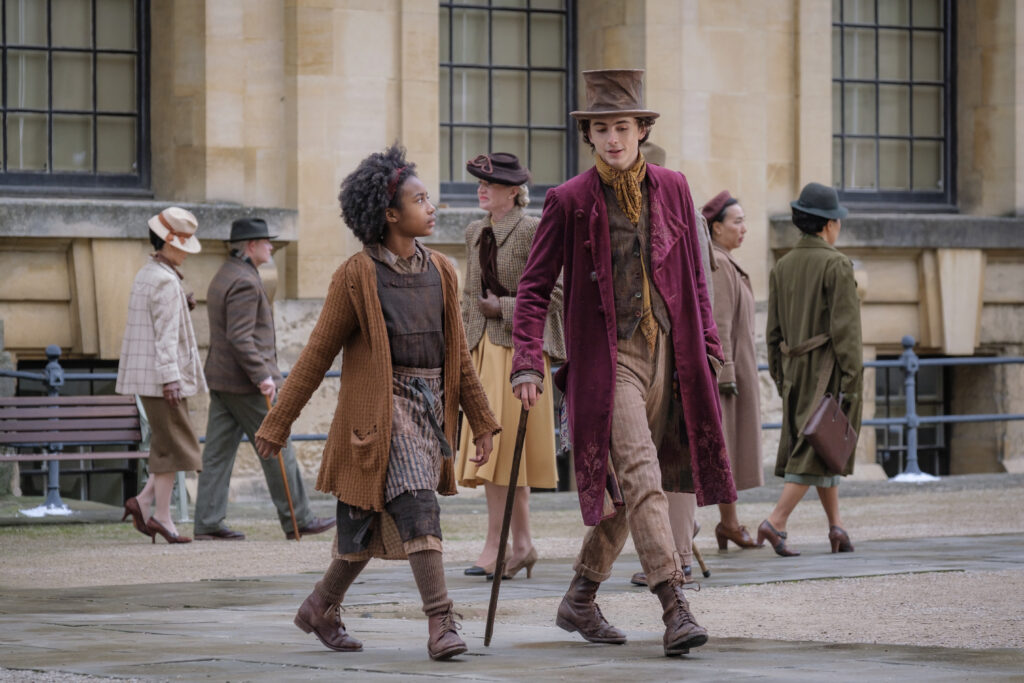
Directed by Paul King
Culture Representation: Taking place in an unnamed island city in England, the musical “Wonka” (which is inspired by Roald Dahl’s 1964 “Charlie and the Chocolate Factory” children’s book) features a predominantly white group of characters (with some black people and a few Asians) representing the working-class, middle-class and wealthy.
Culture Clash: Willy Wonka, a young chocolate maker, attempts to make his dream come true of opening his own chocolate shop, but he is opposed by various villains, including a three-man cartel that wants to have a monopoly on selling chocolate in the area.
Culture Audience: In addition to appealing to the obvious target audience of fans of Dahl and previous “Chocolate Factory” movie adaptations, “Wonka” will appeal primarily to fans of star Timothée Chalamet and family-friendly musicals that have messages about following your dreams, even when faced with obstacles.

“Wonka” is best enjoyed if viewers know in advance that it’s a cartoonish musical that tells an adoring origin story of chocolate maestro Willy Wonka. Scene stealer Hugh Grant as an Oompa Loompa brings some amusing saltiness to this saccharine spectacle. “Wonka” is inspired by Roald Dahl’s 1964 children’s book “Charlie and the Chocolate Factory,” which has previously been made into two feature films featuring Willy Wonka as a middle-aged man: 1971’s “Willy Wonka and the Chocolate Factory” (starring Gene Wilder) and 2005’s “Charlie and the Chocolate Factory” (starring Johnny Depp), with each of those movies presenting Willy Wonka as an eccentric loner who has somewhat bitterly shut himself off from the rest of the world.
Directed by Paul King (who co-wrote the “Wonka” screenplay with Simon Farnaby), “Wonka” depicts Willy Wonka as an earnest and idealist American in his 20s. Willy wants to make his dream come true: opening his own chocolate shop at a place called Galeries Gourmet in an unnamed island city in England. As such, the tone of “Wonka” is much more lighthearted and doesn’t have any of the dark comedy that was in previous “Chocolate Factory” movies.
Neil Hannon wrote the music and wrote or co-wrote the lyrics for the six original songs written for “Wonka,” whose songs are pleasant enough but won’t be considered exceptional classics. The original songs in the movie are “A Hatful of Dreams,” “Scrub Scrub,” “Sweet Tooth,” “For a Moment,” “You’ve Never Had Chocolate Like This” and end-credits tune “A World of Your Own.” The lyrics are occasionally trite, but that could also describe the movie’s screenplay.
When the young version of top-hat-wearing Willy Wonka is first seen on screen, he’s on a shabby-looking ship and singing “A Hatful of Dreams,” as he bounces and dances on the ship with enthusiastic optimism. The movie takes place in an unspecified year, but the costumes indicate that the time period is in the late 1800s or early 1900s. There are also fantasy elements in “Wonka” that use competent-looking visual effects.
Viewers find out that Willy, who is an orphan, has been living at sea for the past seven years, but he now wants to permanently relocate to the city where Galeries Gourmet is located to open his own chocolate shop. In a “A Hatful of Dreams,” Willy sings: “I’ve poured everything I’ve got into my chocolates. Now, it’s time to show the world my recipes.”
A flashback a little later in the movie reveals that Willy as a boy (played by Colin O’Brien) was raised by a single mother (played by Sally Hawkins), who doesn’t have a name in the movie. Willy’s mother is the one who taught him how to make chocolate. She was also the one who told Willy about Galeries Gourmet, which she described as the best place in the world to sell and make chocolate.
As a boy, Willy told his mother that his dream would be for them to have a chocolate shop together at Galeries Gourmet. However, his mother died of an unnamed illness before Willy became an adult. She also died before she ever told him a big secret. It’s at this point in the movie that you know Willy will eventually find out his mother’s secret near the end of the film.
As soon as he arrives in this unfamiliar place, Willy finds out that there’s literally a price to be paid for dreaming. The city’s basic monetary unit is called a sovereign which come in the form of a coin. (It’s similar to what a dollar would be in the United States.) At the retail space where he hopes will be the location of his chocolate shop, there’s a sign that says “No Daydreaming,” with the penalty being a fine of three sovereigns.
Willy dreams about his hoped-for chocolate shop in a musical sequence, but he gets a rude awakening when a cop named Office Affable (played by Kobna Holdbrook-Smith) tells Willy that he has to be fined for this daydream. Willy pays the fine, but that doesn’t stop him from dreaming. Soon after he arrives in his new place, a homeless Willy is offered a place to stay by a gruff-looking brute named named Bleacher (played by Tom Davis), who meets Willy when Bleacher’s pit bull Tittles accosts Willy on a street.
Bleacher takes Willy back to the place where Bleacher works with the cruel and uncouth Mrs. Scrubitt (played by Olivia Colman), who owns a laundry service with Bleacher. Their place of business is also a boarding house, where Mrs. Scrubitt is raising a curious and intelligent orphaned girl named Noodle (played by Calah Lane), who ends up becoming Willy’s closest companion, in a big brother/little sister type of relationship. Noodle is about 12 or 13 in the story. She was raised by Mrs. Scrubbitt since Noodle was a baby.
Upon arriving at the guest house, Mrs. Scrubitt wants to Willy to sign a contract document with several pages. Noodle whispers a warning to Willy to “read the small print” before he signs the document. Mrs. Scrubitt rudely dismisses Noodle and tells Willy that Noodle is overly pessimistic because Noodle is an orphan.
A gullible Willy is so happy that he’s found a place to live, he doesn’t listen to Noodles advice, and he signs the document. Of course, it’s obvious that Mrs. Scrubbit is up to no good. She later uses that contract to punish Willy and force him to work for her in miserable conditions.
Before that happens, Willy seems to be on the right track to opening his chocolate shop. In the town square, he gives out free samples of hover chocs, which are magical chocolates that give people the ability to temporarily float in the air. The hover chocs wear off when the chocolates complete their journey in a person’s digestive system. The hover chocs and Willy are a big hit with the crowd of onlookers who sample the chocolates.
But three wealthy businessmen in the audience don’t like what’s happening and want to crush Willy’s dream of opening a chocolate shop. Mr. Slugworth (played by Paterson Joseph), Mr. Prodnose (played by Matt Lucas) and Mr. Fickelgruber (played by Mathew Baynton) are in a long-running cartel that has been prevented anyone else besides themselves from selling chocolate in Galeries Gourmet. Slugworth is the ruthless leader of this dastardly trio, and he tells Willy that the hover chocs are the worst chocolate he’s ever had. Prodnose is the goofball of the group, while Fickelgruber is the elitist snob, who slightly retches whenever someone says the word “poor.”
Willy’s successful promotional event then gets shut down by the Chief of Police (played by Keegan-Michael Key), who doesn’t have a name in the movie. This police chief is a chocolate addict who is later approached by the cartel to threaten Willy to not open a chocolate shop and get out of town. The cartel offers large amounts of chocolate as bribes to the police chief, who is initially reluctant to accept these bribes and do the cartel’s bidding. The police chief changes his mind because he can’t resist the temptation of this large supply of chocolates.
A running “joke” in the movie is how the police chief gains a lot of weight because of his chocolate addiction. It’s not fully mean-spirited body shaming, but it’s questionable comedy for a family film to make someone’s body size the butt of some not-very-funny jokes. Food addiction, which is an eating disorder, should not be made into something that deserves to get cheap laughs for a movie.
“Wonka” also has the problem of being too overstuffed with villains. In addition to Mrs. Scrubitt, Bleacher, Slugworth, Prodnose, Fickelgruber, and the Chief of Police, there’s a corrupt cleric named Father Julius (played by Rowan Atkinson), who works at a place called Benedict’s Cathedral. The movie also crams in a subplot about an adorable animal that befriends the protagonist, as if it’s a requirement to put a token adorable animal in a family film. In this case, the friendly animal is a giraffe that Willy names Abigail, whose milk Willy needs to make a special type of chocolate.
And there’s more. “Wonka” would have plenty to work with if it only focused on the friendship of Willy and Noodle. But then, there’s a subplot involving four of Mrs. Scrubitt’s employees who form an alliance with Willy. These employees are Abacus Crunch (played by Jim Carter), the skeptical elder of the group; talkative plumber Piper Benz (played by Natasha Rothwell); struggling comedian Harry Chucklesworth (played by Rich Fulcher); and quiet communicator Lottie Bell (played by Rakhee Thakrar), who used to work as a phone operator.
“Wonka” takes very little risks in the story, except for a few things that go outside the norm of these types of movies. Instead of making Willy a super-smart protagonist, “Wonka” makes him illiterate and uneducated. He is taught to read and write by Noodle, who actually comes up with some of the smart ideas that help Willy. However, this unconventional part of the story is overshadowed by many moments that are very easy to predict.
The movie doesn’t have enough of Grant’s Oompa Loompa character (a miniature humanoid with orange skin and green hair), whose sarcastic and grumpy attitude is the perfect counterpart to Willy’s sincere and sunny attitude. The screen time for the Oompa Loompa is less than 15 minutes in “Wonka.” Viewers who like this Oompa Loompa character will wonder if a better movie would’ve been made if this Oompa Loompa, not Noodle, had been Willy’s main sidekick. (Grant previously worked with “Wonka” director King on the first two “Paddington” movies.)
As for the musical numbers in “Wonka,” they are good enough but not mind-blowing. Chalamet performs in the movie like he’s in a stage musical, not a movie, which is another way of saying that he tends to over-act as if he’s playing to the back of a room. It doesn’t ruin the movie, but some people might find it annoying, while others will find it very charming. Lane gives an appealing performance as Noodle. The rest of the supporting characters are written broadly and are a tad generic.
Without question, the strongest asset in “Wonka” is the movie’s production design, which excels in immersing viewers in this vibrant and unique world that often looks like a candy-coated and imaginative playground. Speaking of imagination, toward the end of “Wonka,” there’s a nostalgic nod to the beloved song “Pure Imagination” from “Willy Wonka and the Chocolate Factory.” It’s a moment in “Wonka” that will remind “Willy Wonka and the Chocolate Factory” fans that “Wonka” acknowledges the 1971’s film’s influence, but “Wonka” (for better or worse) is intent on having its own unique place in cinema history.
Warner Bros. Pictures released “Wonka” in U.S. cinemas on December 15, 2023.


